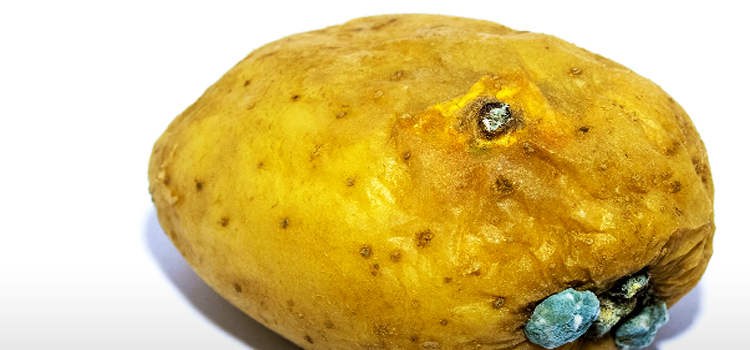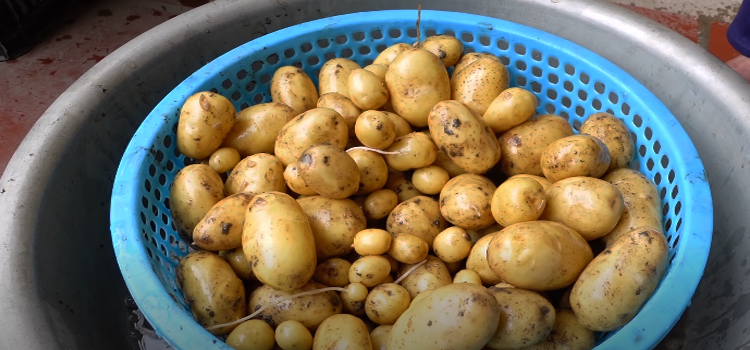Last Updated on July 14, 2024 by Shari Mason
The timeless saying “one bad apple spoils the barrel” has been transmitted through generations and continues to hold significance, illustrating the impact of a single flawed element on a whole group.
But is this saying true when it comes to potatoes? If one potato is rotten, are they all bad?
Let’s discover the answer to this question and discuss why some potatoes can be saved while others cannot.
Can One Rotten Potato Affect All?


Not really. You can just throw out the bad ones and keep the rest.
However, the answer is likely yes if they are all stored together in one place.
If the potatoes were stored separately, then it is possible that only one potato is rotten and the rest are still fresh.
When potatoes [1] are stored together, the bacteria and mold that cause them to rot can spread quickly. If one potato is already rotten, likely, the bacteria has already contaminated the other potatoes, and they may all be rotten.
The only way to tell for sure is to check each potato individually and discard any rotten ones.
Even if a potato looks fine on the outside, it can be rotten on the inside, so it’s important to cut it open and check before eating.
Read:
- Are Yukon Gold Potatoes The Same As Yellow Potatoes?
- If One Potato Has Mold, Are They All Bad?
- How To Tell If Just Egg Is Bad?
- Can You Can Potatoes With The Skin On?
- How To Tell If Butternut Squash Is Bad?
How Can One Bad Potato Spoil The Entire Pile?
One bad potato in a pile can quickly spread its rot and disease to the other potatoes in a pile. This is because the bacteria from the bad potato will spread to the other potatoes, causing them to spoil and rot.
Even if the bad potato is removed, the other potatoes may still be infected and cause them to spoil faster than normal.
Therefore, checking all potatoes in a pile before purchasing or consuming them is important, as it only takes one bad potato to spoil the entire pile.
Read: How To Tell If Chuck Roast Is Bad?
What Happens If You Eat A Rotten Potato?
If you eat a rotten potato, it can make you very ill. Eating a rotten potato can cause food poisoning due to bacterial contamination.
Symptoms of food poisoning from a rotten potato can include nausea, vomiting, diarrhea, stomach cramps, and fever.
“Not everyone can be a truffle. Most of us are potatoes. And potato is a very good thing to be.”
― Massimo Bottura, Italian Chef
In some cases, eating a rotten potato can also lead to more serious health complications such as dehydration, kidney failure, and even death.
It is important to avoid eating any food that looks or smells off, as it may contain harmful bacteria that can make you very sick.
Read: Can You Eat A Sweet Potato With Sprouts?
Do You Have To Throw Out All Potatoes If One Is Moldy?
No, you do not have to throw out all potatoes if one is moldy.
If you spot mold [2] on one of your potatoes, you can cut off the affected area and the area around it, making sure to throw away the affected pieces.
If the potato is soft or mushy, it is best to throw it away, as mold can spread quickly and contaminate other potatoes.
Read: How Much Does The Average Potato Weigh?
Signs That Potatoes Have Gone Bad


- The skin of the potato has become wrinkled or slimy.
- There are dark spots on the potato.
- The potato has a soft texture.
- The potato has a foul odor.
- The potato has begun to sprout.
Read: Is It Okay To Eat Slightly Undercooked Potatoes?
Tips On How To Store Potatoes To Extend Shelf Life
- Choose firm potatoes without any green discoloration, sprouts, or soft spots.
- Store potatoes in a cool, dark, and dry place. The ideal temperature for storing potatoes is between 45 and 55 degrees Fahrenheit.
- Do not store potatoes near onions or other fruits and vegetables, as this can cause them to spoil quicker.
- Place potatoes in a paper or plastic bag and store them in a dark cupboard or pantry.
- If you want to store potatoes for longer, place them in a cool root cellar.
- Potatoes should not be stored in the refrigerator, as this can cause them to become discolored and gritty.
- Check potatoes regularly for signs of spoilage and discard any that have become soft or discolored.
Read: How Do You Make Martha Stewart Sweet Potato Casserole?
FAQs
u003cstrongu003eWhat happens when a potato is rotten?u003c/strongu003e
When a potato becomes rotten, it will develop a soft, mushy texture and a bad smell. It can also become discolored and moldy. The potato should be discarded immediately, as it is no longer safe to eat.
u003cstrongu003eCan breathing rotten potatoes make you sick?u003c/strongu003e
Yes, breathing in rotten potatoes can make you sick. The fumes from the potatoes may contain harmful bacteria and toxins that can cause nausea, dizziness, and other unpleasant symptoms.
Key Takeaways
If one potato is rotten, other potatoes in the same container are likely beginning to rot.
Therefore, it is important to inspect all potatoes in the container and discard any that are beginning to show signs of rot.
Taking preventative measures, such as proper storage and regular inspections, can help to reduce the risk of a rotten potato spoiling a large batch.
References:
- https://www.medicalnewstoday.com/articles/280579
- https://www.cdc.gov/mold/faqs.htm
- How to Cancel a Pizza Hut Order? Quick & Easy Guide - July 26, 2024
- How Long Do I Cook a DiGiorno Pizza? Perfect Timing Tips - July 26, 2024
- What Kind of Advertising Do Restaurants Use? - July 24, 2024

